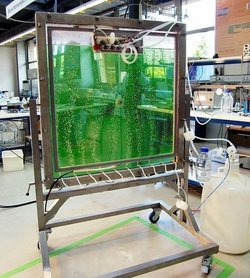Dec 15 2009
Hydrogen (H2) produced from water has great potential to be an environmentally friendly energy carrier of the future. However, the future application of hydrogen and other CO2-neutral sustainable fuels also requires the development of production methods that can contribute to the energy supply of tomorrow. Some unicellular green algae and cyanobacteria use light to break up water into hydrogen and oxygen. In cooperation with eight partners, KIT scientists are currently working on the development of highly efficient methods for hydrogen production from microalgae. The BMBF is funding the "HydroMicPro" project with a total of 2.1 million euros.
 The plate reactor in the laboratory used to cultivate algae guarantees optimal light management. (© KIT, Florian Lehr)
The plate reactor in the laboratory used to cultivate algae guarantees optimal light management. (© KIT, Florian Lehr)
The "H2 from microalgae: With cell- and reactor design towards economically feasible production" (HydroMicPro) project is being coordinated by Professor Clemens Posten from the KIT Institute of Engineering in the Life Sciences and involves several universities, research institutions and companies. The German Federal Ministry of Education and Research (BMBF) is supporting the project for the next three years with funds from the "Grundlagenforschung Energie 2020+" programme (Basic Energy Research 2020+). "The HydroMicPro project is focused on the development of an affordable, highly efficient production process with optimised biology and process technology in order to create the prerequisites for the production of large amounts of hydrogen," said Posten.
The goal of the project is the economic production of hydrogen from microalgae
The objective of the project is to achieve costs of around 25 euros per square metre of soil area for the cultivation of algae. The partners from science and industry will be working on research topics such as photobioreactors, gas separation using membrane methods, biological sensor technologies for cellular oxygen, the biotechnological optimisation of algae as well as system integration. In addition, they will carry out practical field tests and test the application of the hydrogen production method in the aerospace industry, as well as doing environmental and cost analyses. Besides the KIT (northern and southern campus), the project also involves the University of Bielefeld, the Max Planck Institute for Molecular Plant Physiology in Potsdam, the University of Potsdam, Ehrfeld Mikrotechnik BTS GmbH (EMB) based in Wendelsheim, IGV GmbH in Nuthetal as well as OHB-System AG based in Bremen.
The KIT's microalgae research group will be responsible for developing an optically structured photobioreactor for the production of hydrogen. Initially, it is planned to enlarge the inner surfaces of the reactor in the hope that, combined with very thin cell layers, this will lead to high efficiency and enhanced cell concentrations. In addition, the algae will be exposed to carbon dioxide through membranes in order to reduce the use of auxiliary energy. This step also involves the KIT's Engler Bunte Institute. The reactor will be developed in two stages. The initial stage will focus on achieving high biomass production, which is also required for the production of other algal substances. The second step will focus on optimising the hydrogen production system.